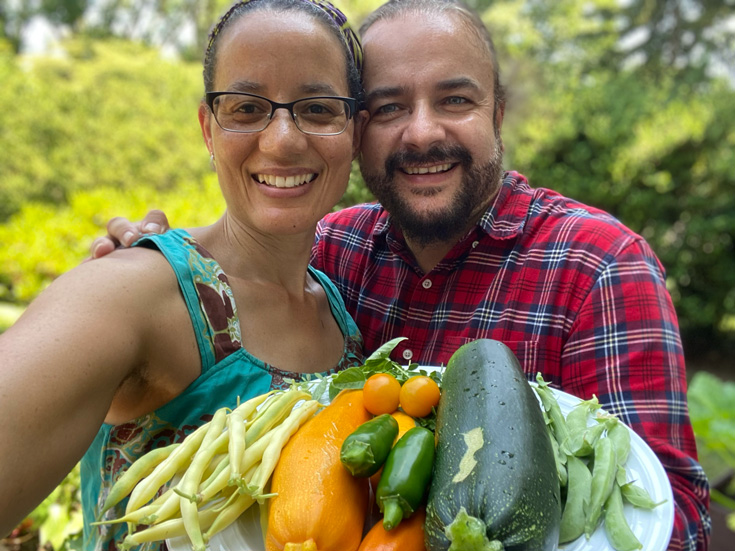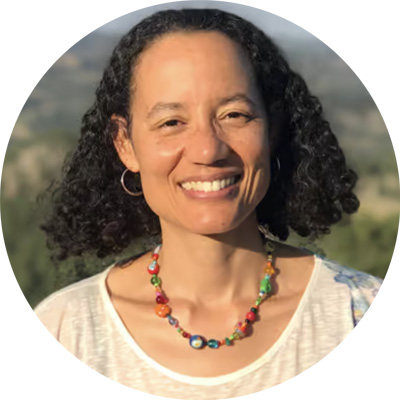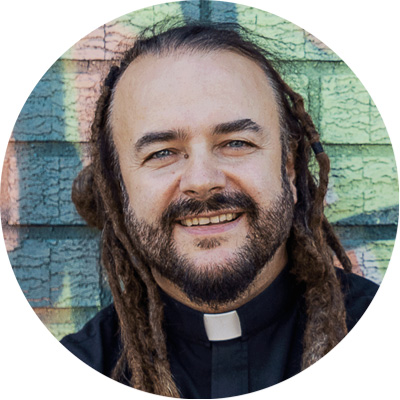As a couple in a Buddhist-Christian marriage, we’ve come to learn that love is a practice. While our traditions hold different views and theologies, they also offer us opportunities to meet in a place beyond words, in what Father Bede Griffiths, a Hindu-Christian monk, called “the cave of the heart.” In this place, our differences are experienced as enriching gifts.
Over the years, our cultural landscape’s view of intimate relationships has changed greatly. In the past, the form and function of many of our relationships were dictated by family, societal norms, and religious beliefs. Marrying someone was typically a decision made by one’s family, who had the authority to approve or reject potential partners.
“Love means saying a complete ‘yes’ to each other each day. A yes that says: No matter what happens to you in this life, I am with you. ”
Modern life in the West is now very different, with a greater amount of individual freedom and much less involvement of family and community in our decision making. Those who feel called to life-long partnerships often navigate the relationship journey on their own. Popular culture encourages us to base our relationships on romance and the passionate feelings they stimulate in us, however impermanent they may be. Perhaps we need something deeper than just passion to offer us stable ground to walk on.
Relationship psychologist John Welwood said, “in former times, if people wanted to explore the deeper mysteries of life, they would often enter a monastery or hermitage far away from conventional family ties.” But that for so many of us today, “the intimate relationship has become the new wilderness that brings us face-to-face with all our gods and demons.” If both partners are willing to engage at this level, intimate relationships can become a new home for interpersonal work and spiritual realization.
Relationships can be the equivalent of a monastery where we “free ourselves from old habits and blind spots” and work to discover a deeper dimension of life. Our relationships can become places of practice and transformation, where we can touch the holy and be changed by it, not just for our own sake but also for the sake of our broken world.
We didn’t find each other until our mid-forties. We were born in different parts of the world. Kaira Jewel was born in Chicago into an ecumenical Christian community that transformed an old insurance building into a kind of urban monastery for the few hundred families that lived there. They also served the poor by facilitating many village and human development projects around the world. Each morning, while still in the dark, they would go to a candle-lit chapel for daily office, where they would pray together the Liturgy of the Hours, welcoming the new day.
As a child of an interracial marriage, Kaira Jewel learned early on to reckon with what it means to be Black and bi-racial in a country that centers whiteness. After college, she met the Vietnamese Zen Master Venerable Thich Nhat Hanh, a teacher of Engaged Buddhism who introduced the world to the practice of mindfulness and taught beautifully with his life what it means to be “the change we wish to see.” Inspired by this, Kaira Jewel entered the Plum Village monastic community, where she ordained as a Buddhist nun. She spent her twenties and thirties in a profoundly rich time of service and inner work.
Adam was born and grew up in Poland. As a child, he felt safe and loved by his family, but the state violence of the Polish government impacted him greatly. From an early age, Adam was inspired by the examples of the priest-activists he encountered, who seemed to be in touch with a power greater than the totalitarian state and had the unique ability to make it known to others. From them, Adam learned that saying “yes” to God meant saying “no” to everything that violates God’s compassion and justice. He also learned that there were consequences to that — some of those priests were eventually murdered by the state.
When Adam came to the United States as an undocumented immigrant with his parents at age 17, he felt clear about his vocation. After college, he lived his spiritual calling as a “new monastic,” serving homeless youth on the streets of Delhi, Orlando, and New York City. This street community became Adam’s church, teaching him what prayer and spiritual life was all about. He was eventually ordained a priest in the Episcopal Church.
By the time we met, Kaira Jewel was a lay Buddhist Dharma teacher, having left the monastery, and Adam was an Episcopal priest, having worked with homeless youth. We were ready to meet. We were clear that our relationship needed to embody our deepest spiritual aspirations.
We came together because we fell in love and experienced all the emotions that accompany it, but we also understood that an enduring love is not just a feeling. Love is a choice and a vow. It is a choice that is often accompanied by feelings; feelings that are at times life-giving and magical, and, at other times, very inconvenient and hard to bear. It’s for this reason that we felt that our love called us to a life of spiritual practice that centers forgiveness and seeing the good in each other. A life where each day we can take steps towards each other, where we can learn to be vulnerable with each other, share our appreciations and confess our shortcomings and hold each other with compassion when one is in pain.
Love in this context means saying a complete “yes” to each other each day. A yes that says: No matter what happens to you in this life, I am with you. I am here to help you see the gift that you are in the eyes of the Divine. I am here to help you polish the mirror of your heart so the light of your buddhanature can be more and more reflected in you each day. I am here to keep you accountable, so you don’t waste this precious life of yours by playing small and not becoming the person that your spiritual aspirations call you to be. We are here, for each other and with each other, to discover who we need to be each day for the world.

We view our home as a small Buddhist-Christian “hermitage.” Our days often begin in our chapel-meditation room, which has two altars, one Buddhist and one Christian. We start with an hour of contemplative practice, which includes silence, readings or chants and conversations that set the tone for the day. The rest of the day is spent in service, either in person or online. Kaira Jewel teaches and leads contemplative practices, offering spiritual guidance within her Buddhist, mindfulness, and activist communities. Adam participates in the daily office and mass at the Cathedral, where he serves as a priest, teaches contemplative prayer through the Center for Spiritual Imagination, and sometimes provides spiritual support to formerly homeless youth.
We try to conclude our day with the practice of Examen, inspired by St. Ignatius of Loyola’s method of looking at our day through the eyes of the divine. We’ve adapted this into a Buddhist-Christian practice to help us reflect on the gifts and learnings from each day.
We also practice a weekly ceremony together called “beginning anew,” as taught Thich Nhat Hanh and Sister Chan Khong. This practice invites us to appreciate each other’s goodness, express regrets, ask for forgiveness, and start each week with a new energy and perspective.
From the “cave of the heart,” we discover, within these practices, that God, or what Buddhists might call “ultimate reality,” is greater and more complex than any of our theologies can capture. It also has varied dimensions for human encounter. As Lama John Makransky, professor of Buddhism and Comparative Theologies in Boston College said, “Buddhists and Christians are taught to focus most intensively upon different aspects of that reality… they tend to realize different qualities of it more fully or realize similar qualities differently.” In that sense, integrating these experiences in our lives allows us to grow our hearts in new and surprising ways.
It’s important to acknowledge that doing spiritual practice together will not, by itself, sustain a healthy marriage. We also engage in all the other essential aspects of life: sharing meals, caring for our dog, learning how to grow in intimacy and connection, struggling with time management and daily chores, making joint financial decisions, cultivating friendships, and having fun. Some of those activities, like some of our contemplative practices, come easily and others are difficult.
Our lives are not ideal. We fail a lot. But the beautiful thing about looking at life as a spiritual practice is that each day and moment offers a new opportunity to start again. Each day and moment can return us to this vow and prayer, based on the interwoven teachings of St. Francis of Assisi and Shantideva:
Lord, make me an instrument of your peace.
Where there is hatred, let me sow love;
where there is injury, pardon;
where there is discord, union;
where there is doubt, faith;
where there is despair, hope;
where there is confusion, clarity;
where there is sadness, joy.May I become at all times, both now and forever
a protector of those without protection;
a guide for those who have lost their way;
a ship for those with oceans to cross;
a bridge for those with rivers to cross;
a sanctuary for those in danger;
a lamp for those without light;
a place of refuge for those who lack shelter;
and a servant to all in need.For as long as space endures,
and for as long as living beings remain,
until then may I, too, abide
to dispel the misery of the world.O Divine Teacher,
(Inspired by Francis Clooney, SJ)
Grant that I may not so much seek to be consoled as to console;
to be understood as to understand;
to be loved as to love.
For it is in giving that we receive;
it is in pardoning that we are pardoned;
and it is in dying that we are born to eternal life. Amen.
Kaira Jewel Lingo and Fr. Adam Bucko will lead an in-person retreat March 7-10 on “Spiritual Radicals: Learning from Buddhist and Christian Saints and Bodhisattvas” at the Garrison Institute.

KAIRA JEWEL LINGO
Kaira Jewel Lingo is a Dharma teacher with a lifelong interest in spirituality and social justice. Her work continues the Engaged Buddhism developed by Thich Nhat Hanh, and she draws inspiration from her parents’ lives of service and her dad’s work with Martin Luther King, Jr. After living as an ordained nun for 15 years in Thich Nhat Hanh’s monastic community, Kaira Jewel now teaches internationally in the Zen lineage and the Vipassana tradition, as well as in secular mindfulness, at the intersection of racial, climate and social justice with a focus on activists, Black, Indigenous, and People of Color, artists, educators, families, and youth. Based in New York, she offers spiritual mentoring to groups and is author of We Were Made for These Times: Ten Lessons in Moving through Change, Loss and Disruption and co-author of the forthcoming,Healing Our Way Home: Black Buddhist Teachings on Ancestors, Joy and Liberation (Feb 2024) from Parallax Press. Her teachings and writings can be found at www.kairajewel.com.

FR. ADAM BUCKO
Adam Bucko is an Episcopal priest, teacher of contemplative spirituality, and an interfaith activist. Born and raised in Poland under a totalitarian regime, his early exposure to spiritual activism greatly influenced his life trajectory. His books and teachings often include collaborations with spiritual leaders and activists from different faith traditions. He is author of Occupy Spirituality: A Radical Vision for a New Generation; The New Monasticism: An Interspiritual Manifesto for Contemplative Living, and his newest book is Let Your Heartbreak Be Your Guide: Lessons in Engaged Contemplation. Additionally, Adam has been actively involved in social and ecological justice efforts and has helped to found organizations and communities that combine contemplative practice with activism. He spent more than 15 years working to support BIPOC and LGBTQIA+ young people who are homeless or housing insecure in New York City. Currently he serves as a director of The Center for Spiritual Imagination located at the Cathedral of the Incarnation in New York, dedicated to democratizing the gifts of monastic spirituality and teaching contemplative spirituality in the context of hearing and responding to the cry of the poor and the cry of the earth. Learn more at fatheradambucko.com
